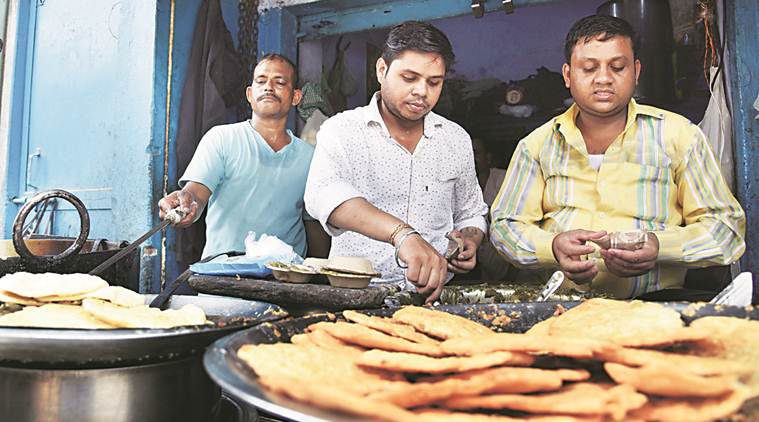- India
- International
How a kachori shop in Aligarh has become a GST test case
This was outside Aligarh’s famous Mukesh Kachori Bhandar, and he was a member of the special investigations branch (SIB) of the state GST department in Aligarh deputed to prepare a “profile”.
 Bunty (centre) and his brother Bhagwan Das (right) run Mukesh Kachori Bhandar with their father. (Express photo by Karan Saraf)
Bunty (centre) and his brother Bhagwan Das (right) run Mukesh Kachori Bhandar with their father. (Express photo by Karan Saraf)
For three days this month, his only job was to watch dough balls being flattened and dunked in oil; aloo ki sabzi being thrown in plastic bowls and raita poured on top. And as people jostled for a plate of aloo-kachori, he diligently took notes.
This was outside Aligarh’s famous Mukesh Kachori Bhandar, and he was a member of the special investigations branch (SIB) of the state GST department in Aligarh deputed to prepare a “profile”. The department had received a tax evasion complaint last month. And on June 20, Mukesh Kachori Bhandar was raided by a team of 12 officials.
“Our estimate is that Mukesh Kachori Bhandar’s yearly turnover is between Rs 60-70 lakh, which means he is liable for GST registration but hasn’t got it done… our estimate is that the owner sells aloo-kachori worth Rs 17,000-20,000 per day,” said A K Maheshwari, Commerical Tax Officer, Aligarh.
R P S Kauntey, deputy commissioner, Commercial Tax Office, who led the investigation and the raid, told The Indian Express, “We did the recce in three phases — peak hours (7 am-11 am), normal hours (11 am-2 pm) and dying hours (2 pm-4 pm). The official waited for 45 minutes at 8 am for a plate of aloo-kachori and didn’t get it because it was that crowded. During normal hours, he waited for 10 minutes, and during dying hours, he got his plate in a couple of minutes”.
On June 20, during the “dying hours,” Kauntey raided the Mukesh Kachori Bhandar. “Even as the raid was going on, at least 45 people were eating aloo-kachori, and a 100 dough balls were being readied,” he said.

At the hole-in-the-wall kachori shop, there’s not enough space to stand for owner Makhan Lal (70), his three sons Mukesh (40), Bhagwan Das (35) and Bunty (29) and their two helpers. And though business is still brisk, Lal hasn’t eaten properly since the raid, while his sons run the shop. A plate costs Rs 24 and a cup of raita Rs 5.
“They have received the wrong information, I don’t make more than Rs 2,000-Rs 3,000 a day… less than Rs 12 lakh a year. This means I am not liable to do GST registration. I am just making enough to feed 15 mouths in the family. Do they want me to add GST on aloo-kachori now? It will be too expensive, who will buy it?” said Lal.
Incidentally, states like Uttar Pradesh have been proactive in curbing evasion, including a renewed focus on tracking those liable to pay tax but who continue to stay out of the tax net. Apart from small businesses that attempt to stay out of the net, other evasion methods include retailers masquerading as end-consumers in their purchases from wholesalers and lakhs of registrants not filing returns despite having made purchases.
The Centre has also been taking measures to boost compliance under the indirect tax regime of GST, such as the e-way bill and a proposal to roll out an e-invoices system for B2B transactions from January 2020. It had also recently approved sharing of data between income tax authorities and GST Network (GSTN) to check for discrepancies between returns of direct and indirect taxes.
According to Lal, the family began selling aloo-kachori from the rented shop “less than two years ago” after several failed businesses. Maheshwari, however, said the business was registered with the Food Safety and Drug Administration in 2016 and is a known name in Aligarh, having existed for “over five years”.
Every day, Lal’s three sons reach the shop at 4 am and begin preparing 25 kg aloo-sabzi using their own masala, 15 kg dough for the kachori and raita made out of seven litres of curd. Two helpers – paid Rs 300 a day according to the family – reach the shop by 6 am, and an hour later, the crowd trickles in.
“The district court, the bus stop, the railway station and a school are around the shop and people from all over Aligarh and UP come to the shop. We are open seven days a week and on all festivals,” said Das.
While his father and elder brother are worried about the raid, Das said: “It’s good only… we are on Facebook and WhatsApp. We are internationally famous now.”
On Wednesday afternoon, a food blogger from Lucknow took a video of helper Sushil Kumar Saini deep frying the kachoris, while regular Aman Thakur (26), a property dealer, stopped for lunch at the shop.
A regular customer Anshul Khatri (25), who works at a food mart in Aligarh, recalled buying a plate for Rs 9 a few years ago. “Of course, rates have gone up but it’s worth it. My brother lives in Delhi and whenever he visits, we make it a point to come to Mukesh Kachori Bhandar…it’s a part of our childhood memories,” he said.
According to Kauntey, during the raid, the shop had “four commercial gas cylinders in a storeroom upstairs, and two in the shop, each costing Rs 1,800. They told us they use curd worth Rs 800 daily, a tin of refined oil and other ingredients. They are spending Rs 6,000-Rs 7,000 daily”.
Kauntey said that once the report is prepared within 90 days of the raid, it will be submitted to the adjudicating wing of the state GST department, who can then send a notice to the owner of the shop.
Apr 26: Latest News
- 01
- 02
- 03
- 04
- 05








































